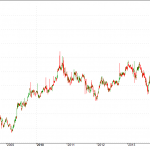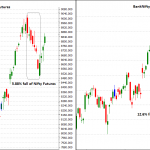 A troubling thought, isn’t it?
A troubling thought, isn’t it?
I Know…
You might be feeling like saying – Are You Nuts?
This is surely.. Impossible.
You are like Drunk or What? Hehhh..
We have heard a lot about day traders who become millionaires by trading with few bucks…
but how anyone can incur a loss of more than 100% of the invested capital in a trade?
Confusing and feels like disgusting… Right?
But what if I tell you further that this trader had the loss in the same trade in which he had a profit of Rs. 6 lakhs
but still he lost Rs. 18 lakhs.
That`s sound totally absurd and foolish.. I guess so.
feels like some scam, isn`t it?
But some of you who have been reading us from last few time must be able to make out what we are talking about is nothing fake but real…
must be thinking I know this and I have always avoided such traps when trading..
Request you those . Please bear with us..
So, let`s straight get to the story….
This incident happened with a trader on Jan 25th, 2017 (an expiry day) where this trader saw an opportunity to make big quick bucks.
He saw Nifty Index weighted average indicating Nifty to close above 8600 mark and where Nifty 8600 calls were trading @ just Rs. 0.05 (5 paise).
So, he bought some 3000 lots of Nifty 8600 call @ 15:25 @ Rs. 0.05.
investing some Rs. 11250 (0.05 x 3000 x 75)
Those who are new to options –
As he was of the opinion that the Nifty will surely expire at a price above the 8600 mark.. so he will make profits on the 8600 calls he just bought…
And, guess what – It surely did.
Nifty index did settled that day @ level of 8602.75.
Wowww.
By this he should have made a total profit of Rs. (8602.75-8600) x 3000 x 75 = Rs. 6,18,750.
A return of 5500% on his invested capital of Rs. 11250 and that too in just 5 minutes…
Hey that`s great,
But those who are aware about the options market and haven`t heard something like this must be thinking…
Everything is correct here so where is the flaw..?
Profit means buying low and selling high.. Isn`t it? and he did all correct.
Buying @ Rs. 0.05 and getting it settled @ Rs. 2.75 (8602.75 – 8600)
From where this loss thing can come into the picture
I know a bit about options too.
the loss is limited to the amount of premium we pay. So, the maximum loss he can incur is his investment of Rs. 11250.
Yes. This is what he even thought till he got the contract note in the evening from his broker.
A net debit / net loss of Rs. 18 lakhs.
The trader knew very well that the options contract will get settled @ the closing price of the Nifty index which will be decided as per the weighted average price of the last 30 minutes
So, he calculated very well the settlement mechanism and must have also considered the cost of the trade where he had to pay less brokerage as we are expecting he must have been trading with a discount broker.
But what he forgot to ask is why such option contract is trading @ Rs. 0.05
Where are the rest of the traders – the institutions, Foreign Institution Investors (FII`s), professional traders?
Those who use algorithms / automated trading systems to spot such mis-pricing in the market and make some quick bucks within the short time.
Why they are not interested to buy that option even when everyone knows that the Nifty Index was going to settle well above the 8600 mark and that option will expire In-The-Money (i.e. with some value in it)?
Is he the only one who was able to spot such million dollar opportunity?
where you can buy as many lots as you like and make big lofty profits within 5 minutes…
This trader was right with the settlement process of options that it will settle as per the close price of Nifty Index which is weighted average of last 30 minutes but didn`t considered the most important element of trading – Taxes.
where you pay a higher percentage of tax on the expiring In-The-Money options than the Out-Of-The-Money options.
Specifically talking about Securities Transaction Tax (STT).
This is what we have discussed months ago in great depth on the subject where we outlined in the article How to Turn Bank Nifty Weekly Options into a Regular Income-Driving Machine? not only how the institutions and smart traders make money from options trading
but we also made you aware in the article Warning: 5 Traps To Avoid When Trading Bank Nifty Weekly Options on the Expiry Day about the traps most new comers fall into and which are surely to be avoided at any cost when trading options
and how the theoretical adage of “Limited Loss with Buying Options” is not completely true in all cases where we can even get trapped and lose more than the value of the premium even after having a profitable trade.
You can read the above article to know further in deep how to not avoid falling into traps when trading options.
# TRAP 1. Not Selling In-The-Money Options Before Expiry
# TRAP 2. Buying Options which are Trading at Less Price than the Actual Theoretical Value on the Expiry Day
# TRAP 3. Waiting too Long to Buyback the Short Options
# TRAP 4. Buying Deep In-The-Money Options
# TRAP 5. Option Pricing are based on Bank Nifty Futures Contract
To remind you again, STT is charged on the sell transaction of future and options contract.
- Each futures trade is valued at the actual traded price while option trade is valued at premium.
- On this value, the STT rate is applied to determine the STT liability.
- In case of final exercise of an option contract via exchange, STT is levied on settlement price if the option contract is In-The-Money.
- Below are the current STT rates that are charged on Futures & Options Trading in India
a Sale of an option in securities 0.05 percent Seller b Sale of an option in securities, where option is exercised 0.125 percent Purchaser c Sale of a futures in securities 0.01 percent Seller For more visit Securities Transaction Tax on NseIndia.com
To make it simple,
STT on normal option trades done in the market is charged at 0.05% on the selling side of the premium value of the option irrespective of whether you buy first or sell first.
In his case, if he would have sold his option in the market then the STT he had to pay was Rs. 5.625 (0.05 x 75 x 3000 x 0.05 percent) i.e. Total premium x 0.05%.
But that does not mean he would have made any profit as the market price was trading at of the 8600 call was only 0.05.
While, on the other hand, when you buy options and let your In-The-Money option contract expire (when you do not square your buy position where market is closing above [in case of call] or below [in case of put] on the day of expiry of the options contract) then it will be settled via settlement route @ the closing price of the underlying
then STT rate will increase from 0.05% to 0.125% and it will now be charged on the total value of the contract and not on the premium value.
As in his case, Nifty Index was indicating a close above the Strike Price (8600) of his call option i.e. the 8600 call is expiring In-The-Money so the STT charged was Rs. 24,18,750 (8600 x 75 x 3000 x 0.125 percent) i.e. total value of the contract x 0.125%.
Mostly new comers are prone to such risk as they are more tuned and fascinated towards buying cheap low priced option contracts especially on the expiry day. Such surely has low risk to reward but this reduces the probability of the trader to be successful
And you know
the worst part is…
More than 70% of the option contract expire worthless and becomes Zero.
So every time who buys a option contract has only 30% chances of being successful.
We outlined in How to Turn Bank Nifty Weekly Options into a Regular Income-Driving Machine? how new traders feels like getting a magical wand of buying cheap out of the money calls
and this becomes a nightmare when such habit of buying cheap or junk priced options dreaming that such is giving them a Million Dollar Opportunity
but unaware of the way these options are settled and priced leads them
under the trap of having a Contract Shock
where they do not square the bought options thinking it might incur additional trading cost but where such options expires In-The-Money.
Whenever buying such low priced options, do consider that it is not the price at the which the options is trading rather it is more about evaluating the probability that we are expecting the trade to be successful and asking why they are trading at less price than the theoretical values.
There are generally two reasons why some of the options which are close to the current traded price starts trading at different price than the theoretical values on the day of expiry: –
1. STT
2. Settlement Price
Therefore on the expiry day, If you see options which seem to be cheap (trading lesser than theoretical value) during the last half hour of the trade, do consider the fact that the market is discounting that the settlement price will be different than the current traded price (if nifty has rallied or fall in last 30 minutes on expiry).
and also because of the higher STT rate that which will be charged if you do not square your position in the market but rather will let your In-The-Money options expire and get it settled via settlement route.
Do remember, they are trading at less price because of a reason.
Earlier such risk was there once a month where expiry used to happen last Thursday every month. But now this risk has increased four times as now the bank nifty contracts has started to settle weeklies i.e. every Thursday.
Such may get extended to weekly contracts of stocks as well as nifty in the future so anyone can get trapped if didn`t had the right info available.
Also, with the technology advancement where you can open your account and start trading in less than hour, more new traders will enter the market with a objective to make money so it becomes our duty to make them aware with right knowledge to help prevent falling under such stupid traps.
Therefore, to be successful at this business first one needs to know the mechanism of the business i.e. how the contracts are settled and frame up personalized rules first to be safe and then profitable.
More than making money its about keeping self safe from losing money. Because capital is like merchandise for the trader – If you have merchandise on the shelf then only you can sell it to make money.
We shared this article Warning: 5 Traps To Avoid When Trading Bank Nifty Weekly Options on the Expiry Day in the month of August 2016 and this incident happened in Jan 2017. If this article would have reached him then we could have saved this loss of Rs. 18 lakhs.
We gave a similar example where a trader made a loss on his profitable psoition due to lack of understanding of settlement mechanism.
Therefore, Spread the word amongst your trader community so that no one losses their hard earned money by getting nothing in return.
Trading losses are the part of this business, but such stupid ones need to be avoided at any cost.
You can read about the incident in his own words which he has shared while filing a petition to Shri Arun Jaitley (Minister of Finance), SEBI, NSE & Minister of State at Change.org – Security Transaction Tax(STT) -A bad deal for traders & a systemic risk for capital markets
Important Notes And Q&A
#1. All the bought options expiring In-The-Money should be squared off in the market as not doing so will attract higher STT and too not on the options premium rather on the total contract value.
#2. Should I sell my bought options if they are trading @ Rs. 0.05 on the expiry day?
From this incident, we can understand that there are times when even the options trading @ Rs. 0.05 (worthless) will be considered In-The-Money if market expires above the strike price of the call option or below the strike price of the put option.
So, it does not matter whether the option is trading @ 0.05 or with some value, if the market is expiring near to your purchased option (call or put) it is always better to square your position in the market and do not let it expires.
Even in this case, the market must be trading above or below the 8600 @ 15:25 where the 8600 call was trading @ Rs. 0.05 which may give you wrong hints that your option is closing out-of-the-money. But actually, the closing can come below or above the 8600 level as per the weighted average price of the last 30 minutes. The trader had the right knowledge that the closing price will come above the 8600 level based on the weighted average but didn`t knew that about the different settlement process of In-The-Money & Out-Of-The-Money options in terms of STT to be paid.
#3. Why there are many buying or selling bids during the last minute of options even @ Rs. 0.05 or 0.10?
These are the traders who must have bought these options but they fear what if the market move in last few minutes make their bought options In-The-Money. So, to reduce the risk of paying hefty STT traders square their purchased options if the market is closing near the strike price.
#4. Why is the rate of STT for a buy exercised In-The-Money Options is so high?
Theoretically, buying option gives you the right to buy the Nifty Index @ 8600 by paying a premium of Rs. 0.05. So, if the market is expiring above 8600 i.e. the 8600 call option will have some value in it and you are not selling the contract in the market then it is assumed that you exercising your right to buy the Nifty Index @ 8600. Thatswhy, the F&O trades are considered as non-speculative business income where this trade is considered to be delivery based and STT is charged @ 0.125% on the entire delivery value of the contract and not on the premium value.
Now, at least, you know how this all works, and i can expect you can make an informed choice.
Time to read up on how to get started with trading options.
Part VII – Getting Started With Trading – How to Trade Options? – Want to be a full-time options trader but scared of all the jargon’s or find it difficult to understand the dynamics of the options trading. Then you need to read this.
Part I – Getting Started With Trading Options – How does an Options Trade Work? – Getting into Real Trading is complicated. As a new trader, it is important to make your trading task more simple. Get deep into understanding how the options trade work in real market.
Why More Margin is Required to Short / Write Options than Buying Options? – Wondering why you are asked to put up more money when you are writing options than when you buy? It has something to deal with the risk of the trade. But that doesn`t reduces the probability of making smart money from shorting the options than buying. Time to Think..
How to Turn Bank Nifty Weekly Options into a Regular Income-Driving Machine? on how traders specially those who are professionals use Bank Nifty weekly options to make sure money consistently on their capital by writing the options and putting the benefit of the time value decay in their favor. Also, how they use weekly bank nifty options to buy the markets instead of taking positions in the bank nifty futures..
Reading this story really made me felt bad too and it made me realize that the article we written earlier have not reached to the trading community and surely they are not getting educated by the blogs, news channel they follow or broker they work with.
You even might be feeling like blowing up in the public saying that`s all ridiculous…
I know, I am also feeling like loosing my cool.
If you have fallen into such trap, then All is not Ok. Something needs to be done so that no one should face such weird situation ever.
I feel it’s our responsibility and or duty to help them not having such big regret in life. Because those of us who are aware have to speak up and share what we’ve learned.
Do spread this so that no one else can even fall under such trap and suffer such big stupid losses. Take a step forward and Pledge to spread the word via Facebook, Twitter, WhatsApp, or Email so that it reaches to the many as possible.
After all, isn’t that what we’re here to do? Help people? Change somebody’s life for Good?
Shall We start?
Leave me a comment with your thoughts, I will be watching very closely.
KNOWLEDGE IS POWER!
Disclaimer: Please note that all the information shared is solely for the general information purpose only. No information, views, opinions or examples constitute a solicitation or offer by JustTrading.in to buy or sell any securities or to furnish any investment & trading strategy / advice or taxation advice or service. Every attempt has been made to assure accuracy & completeness, we assume no responsibility for errors or emissions.
JustTrading.in advises you to consult with your certified professional finance advisers, chartered accountant & tax advisors before making any investment, trading or taxation decisions. For more, Please Visit & Read: Disclaimer




